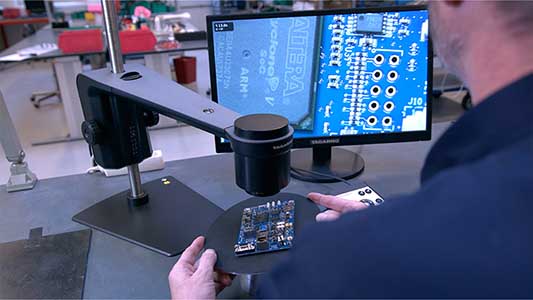TUCKER, GA ― TAGARNO explores the impact of camera microscopes on printed circuit board (PCB) quality control and rework in the electronics manufacturing industry. Discover how these advanced tools enhance precision, efficiency and documentation, modernizing the inspection process
In the fast-paced world of electronics manufacturing, ensuring the precision and quality of printed circuit boards (PCBs) is critical. From quality control to rework on faulty PCBs, the tools you use can significantly impact efficiency and outcomes. This is where the camera microscope, also known as digital microscopes, become indispensable. But why opt for a camera microscope over traditional tools like desk magnifiers or stereo microscopes?
Camera microscopes are gaining popularity within the electronics industry due to their ability to provide high-resolution imaging, advanced analysis capabilities, and ergonomic efficiency, crucial for detailed and accurate inspections of intricate PCBs. The benefits include: unmatched precision and detail, enhanced productivity and efficiency, documentation and collaboration, training and usability, and integration of software and apps for advanced inspections.
For businesses looking to upgrade their PCB inspection and rework capabilities, there are two primary options: integrating a camera into an existing microscope or investing in a digital microscope designed around an integrated camera.
OPTION 1: Adding a Camera to an Existing Microscope
This can be a cost-effective option if you already have a robust traditional microscope setup. Camera attachments are available that can convert a standard microscope into a camera microscope, allowing for digital imaging without the need to replace the entire system. This option is ideal for those who want to enhance their current equipment with digital capabilities while managing budget constraints.
OPTION 2: Purchasing a Digital Microscope with an Integrated Camera
For those starting from scratch or looking to fully capitalize on digital technology, purchasing a digital microscope with a built-in camera is the way to go. These systems are specifically designed to optimize all the benefits of digital imaging, from high-resolution visuals and advanced features/software that optimize efficiency to simplified documentation and improved ergonomics. They represent a long-term investment in top-tier technology that will keep pace with advances in electronics manufacturing.
Choosing a digital microscope with a built-in camera offers numerous benefits by being designed to maximize the advantages of digital imaging technology. A digital microscope with an integrated camera also enhances operational efficiency through features like real-time analysis, easy documentation, and improved collaboration tools. The ergonomic design and user-friendly interface reduce training time and minimize physical strain, boosting productivity and safeguarding worker health.












